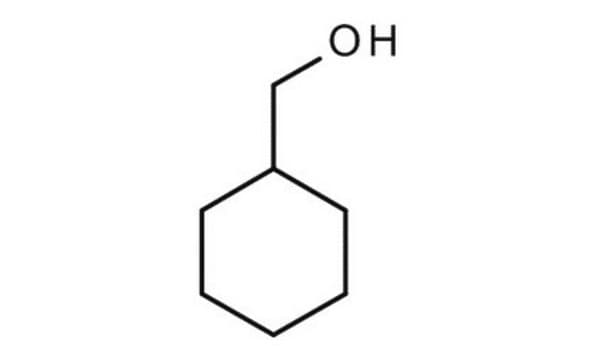8.01372
Ethylbenzene
for synthesis
Synonyme(s) :
Ethylbenzene
About This Item
Produits recommandés
Pression de vapeur
9.5 hPa ( 20 °C)
Niveau de qualité
Pureté
≥99.0% (GC)
Forme
liquid
Température d'inflammation spontanée
430 °C
Puissance
3500 mg/kg LD50, oral (Rat)
15354 mg/kg LD50, skin (Rabbit)
Limite d'explosivité
1.0-7.8 % (v/v)
kinematic viscosity
0.63 cSt(40 °C)
Point d'ébullition
136 °C/1013 hPa
Pf
-95 °C
Température de transition
flash point 15 °C
Solubilité
0.2 g/L
Densité
0.87 g/cm3 at 20 °C
Température de stockage
2-30°C
InChI
1S/C8H10/c1-2-8-6-4-3-5-7-8/h3-7H,2H2,1H3
Clé InChI
YNQLUTRBYVCPMQ-UHFFFAOYSA-N
Catégories apparentées
Application
- Gate-opening Induced by C8 Aromatics in a Double Diamondoid Coordination Network.: This study highlights the unique structural transformations in a double diamondoid coordination network triggered by the adsorption of ethylbenzene and other C8 aromatics, showcasing its potential for molecular sieving and sensor applications (Zaworotko et al., 2024).
- Correlations between blood volatile hydrocarbon concentrations in different types of fire-related deaths.: This research examines the levels of ethylbenzene and other volatile hydrocarbons in the blood of individuals who have died in fires, exploring correlations with exposure levels and fire characteristics (Nishitani et al., 2023).
- VOC data-driven evaluation of vehicle cabin odor: from ANN to CNN-BiLSTM.: This paper introduces a novel approach using artificial neural networks and convolutional BiLSTM for analyzing VOCs like ethylbenzene in vehicle cabins, providing insights into the impacts on air quality and odor perception (Du et al., 2024).
- Exposure and health risk assessment of volatile organic compounds among drivers and passengers in long-distance buses.: Analyzes the exposure to ethylbenzene and other VOCs inside long-distance buses, assessing the associated health risks for both drivers and passengers (Chang et al., 2024).
- Exhaled Volatile Organic Compounds for Asthma Control Classification in Children with Moderate to Severe Asthma: Results from the SysPharmPediA Study.: This study investigates the use of exhaled ethylbenzene levels as biomarkers for classifying asthma control in children, offering a non-invasive method to monitor and manage the condition (Maitland-van der Zee et al., 2024).
Remarque sur l'analyse
Density (d 20 °C/ 4 °C): 0.866 - 0.867
Identity (IR): passes test
Mention d'avertissement
Danger
Mentions de danger
Conseils de prudence
Classification des risques
Acute Tox. 4 Inhalation - Aquatic Chronic 3 - Asp. Tox. 1 - Flam. Liq. 2 - STOT RE 2
Organes cibles
hearing organs
Code de la classe de stockage
3 - Flammable liquids
Classe de danger pour l'eau (WGK)
WGK 1
Point d'éclair (°F)
71.6 °F - closed cup
Point d'éclair (°C)
22.0 °C - closed cup
Certificats d'analyse (COA)
Recherchez un Certificats d'analyse (COA) en saisissant le numéro de lot du produit. Les numéros de lot figurent sur l'étiquette du produit après les mots "Lot" ou "Batch".
Déjà en possession de ce produit ?
Retrouvez la documentation relative aux produits que vous avez récemment achetés dans la Bibliothèque de documents.
Les clients ont également consulté
Notre équipe de scientifiques dispose d'une expérience dans tous les secteurs de la recherche, notamment en sciences de la vie, science des matériaux, synthèse chimique, chromatographie, analyse et dans de nombreux autres domaines..
Contacter notre Service technique

















